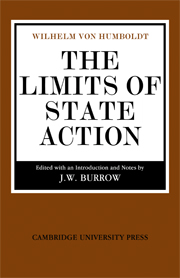Editor's Introduction
Published online by Cambridge University Press: 05 February 2015
Summary
Wilhelm von Humboldt is widely remembered as the architect of the Prussian educational system and the founder of the University of Berlin. To the English student of the history of political ideas, however, he is probably most familiar as the author of a single sentence, taken by John Stuart Mill as the epigraph for his essay On Liberty: ‘The grand, leading principle, towards which every argument unfolded in these pages directly converges, is the absolute and essential importance of human development in its richest diversity.’ Humboldt also, incidentally, a decade later, provided another eminent Victorian, Matthew Arnold, with the epigraph for his Schools and Universities on the Continent. The book from which Mill's quotation was drawn was published in 1854, 5 years before the publication of On Liberty and about the time that, as we know, Mill began to consider writing such an essay. It was a translation of Humboldt's Ideen zu einem Versuch die Grenzen der Wirksamkeit des Staats zu bestimmen—a title which the English translator, Joseph Coulthard, sacrificing modesty to concision, rendered as The Sphere and Duties of Government. Humboldt himself had died in 1835 and the work itself, written when he was a young man in 1791–2, might have been regarded in the 1850S as a museum piece. It had not, however, been published when it was first written, Humboldt anticipating trouble with the Prussian censorship, though sections of it had appeared in Schiller's journal Neue Thalia and in the Berlinische Monatsschrift.
- Type
- Chapter
- Information
- The Limits of State Action , pp. vii - xlivPublisher: Cambridge University PressPrint publication year: 1969
- 2
- Cited by

